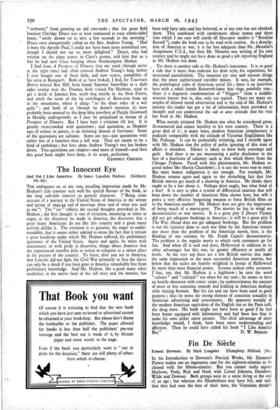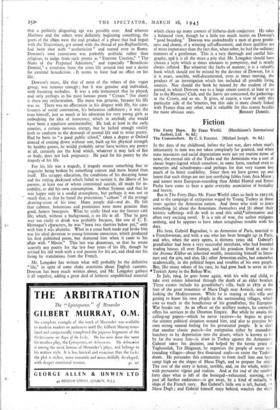Fin De Siècle
Ernest Dowson. By Mark Longaker. (Humphrey Milford. 24s.) IN his Introduction to Dowson's Poetical Works, Mr Desmond Flower makes out an ingenuous case for the eighteen-nineties to be classed with the fifteen-nineties. But you cannot really equate Marlowe, Peele, Ryd and Nash with Lionel Johnson, Davidson, Wilde and Dowson. Both groups were in a sense living at the end of an age ; but whereas the Elizabethans may have felt, and said. that they had seen the best of their time, the Victorians thought
that a perfectly disgusting age was possibly over. And whereas Marlowe and the others were definitely beginning -something, the poets of the i89os were the end product of a phase that had begun with the Tractarians, got mixed with the thread of pre-Raphaelitism, had been shot with " aestheticism " and veered over to Rome. Dowson's own conversion was probably aesthetic rather than religious, to judge from such poems as "Extreme Unction," "The Nuns of the Perpetual 'Adoration," and especially " Benedictio Domini," a revulsion from the crass life around him and a desire for external benediction. It seems to have had no effect on his life.
Dowson's muse, like that of most of the others of this vague group, was tenuous enough ; but it was genuine and individual, with haunting melodies. It was a solo instrument that he played, and only perhaps in his most famous poem " Cynara " (for short) is there any orchestration. His muse was genuine, because his life was so. There was no affectation in his disgust with life, his care- lessness of social convention, his bohemian raffishness-; it was the man himself, just as much as his adoration for very young girls. as embodying the idea of innocence, which in anybody else would have been a repulsive sentimentality. He had, at least in the early nineties, a certain nervous energy, but he lacked enough vitality both to conform to the demands of normal life and to write poetry. Had he been to "a good public school," taken a degree at Oxford instead of coming down without one, built up his physical strength by healthy games, he would probably never have written any poetry at all, certainly not the kind which, whatever it may lack of fire or body, does not lack poignancy. He paid for his poetry by the tragedy of his life.
For his life was a tragedy, if tragedy means something fine or exquisite being broken by something coarser and more brutal than itself. His scrappy education, the conditions of his decaying home and the rotting dockyard which failed to sustain it, the illness of his parents, at least one of whom committed suicide, all made for in- stability, as did his own consumption. Arthur Symons said that he was happy only in a sordid atmosphere, but perhaps it was not sd much that, as that he hated the pretentious " culture " of the average drawing-room of his time. Many people did—and do. He felt that cabmen, bohemians and prostitutes were more genuine than good, honest bourgeois. What he really liked was the literary café life, which, without a background, is no life at all. That he gave way too easily to drink was probably because, like one of C. E. Montague's characters, he was "born two sherries below par," only with him it was absinthe. What in a sense both made and broke him was his ideal devotion to young feminine innocence, which produced his first published poem, but shattered him when it came to his affair with " Missie:" This last was disastrous, so that he wrote scarcely any poetry for the last four years of his life, though he revised his old work with a real passion for his art, and eked out his living by translations from the French.
Mr. Longaker has written what will probably be the definitive "life," in spite of some shaky assertions about English customs. Dowson has been much written about, and Mr. Longaker gathers it all together, adding a great deal of hitherto unpublished material
which clears up many corners of hitherto dark conjecture. He takes a balanced view, though he a little too much insists on Dowson's "good breeding." Dowson was undoubtedly a man of great gentle- ness and charm, of a winning self-effacement, and these qualities are of more importance than the fact that, when sober, he had the ordinary manners of a gentleman. This is a very thorough and careful bio- graphy, and it is all the more a pity that Mr. Longaker should have chosen a style which at times amounts to pomposity, and is nearly always inflated. But whatever the faults of manner, it is a valuable book which should not be missed by the devotee of Dowson, for it it is exact, sensible, well-documented, even at times moving, the product of an investigation which has included all possible living sources. Nor should the book be missed ..by the student of the period, to which Dowson was to a large extent central, at least in so far as the Rhymers' Club, and the Savoy are concerned, the gatherings at the Crown, and so on. It gives, of course, a view of only this particular side of the 'nineties, but this side is more closely linked with France than any other, and is valuable for this reason besides



























 Previous page
Previous page